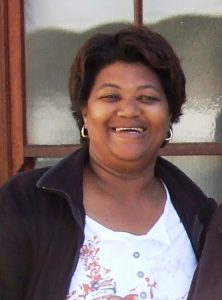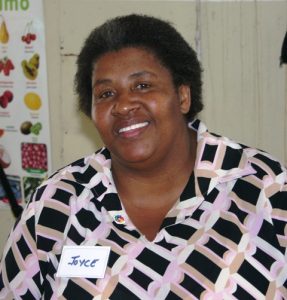South Africa, Cape Town
In 2005, the Founders of Africa AHEAD moved to Cape Town and started to reach out to start CHC projects in the many informal settlements which stretch for miles on the Cape Flats near the city of Cape Town. The University of the Western Cape sponsored a workshop in Khayelitsha, one of the most infamous of the 200 informal settlements where hygiene and sanitation are a real challenge. Dr. Waterkeyn trained 35 health workers associated with an urban renewal project managed by the University. The methodology was seen in a positive light by the Director of Health of the City Municipality, who commissioned a manual and set of training materials for urban Community Health Clubs in South Africa.
Subsequent to this, three training workshops were held and a total of 75 trainees were equipped to start Community Health Clubs using this material. Africa AHEAD as a service provider to the Municipality was not involved in the management of this project and it was difficult to ascertain what the outcome of this training was. However it is estimated that approximately 400 CHCs were formed as a result of the training making an estimated 28,000 CHC members, and a potential of 140,000 beneficiaries.

- Country: South Africa
- Period: 2005-2007
- Donor: City Health Department
- Partner: City Health Department
- Province: Western Cape
- District: Municipality of Cape Town
- Number of households:

Above: Trainers of the CHC facilitators in Cape Town
- Number of CHCs: approx. 400
- Number of Members: approx. 28,000
- Number of government sanitation officers: 75
- Number of beneficiaries: 140,000
Assessment of the CHC Approach in Informal Settlements
The Community Health Club method of community mobilisation came up against a series of challenges in Cape Town
The Director of Health Dr. Ian Toms, understood the idea of the CHC Model. However when he died suddenly the project floundered and was not re-funded.
The highly charged political landscape of informal settlements in Cape Town resulted in the politicization of the CHCs. Although these groups should be non-political, in effect the methodology is an ideal tool for politicians to gather large numbers of the ‘community’ for political ends.
The CHCs were used as a recruiting ground for volunteers for clean ups and casual employment by the City. As such the leadership of a CHC became influential in the area as they were able to provide jobs to cronies.
The City decided to endorse a ‘Metro’ umbrella committee which was to oversee the 400 or so CHCs scattered in 200 informal settlements.
The executive committee of the metro CHC was not trained by Africa AHEAD and did not come from a health perspective.
There was overt racial prejudice towards Africa AHEAD as a service provider as the NGO was seen as a drain on potential resources which could otherwise be manipulated by the metro group.
although the CHCs appeared to be popular in informal settlement, the power dynamics discouraged further involvement by Africa AHEAD in the programme.
Above: The Manual developed by Dr. J Waterkeyn (Africa AHEAD) for Informal Settlements
Hygiene Promotion Partnership
Africa AHEAD also provided mentoring and training for a Health Promotion Programme supported by Brigham Young University of Utah. This involved training the facilitators in the CHC Approach using the visual aids developed for the City, and this enabled the visual aids to be pretested and refined.
A research programme was being conducted to ascertain if diseases such as diarrhoea, ARI, Skin Disease and eye disease will be reduced more effectively if soap and domestic cleaning products are used in conjunction with hygiene promotion.
The programme aimed to track changes in the incidence of disease within 1,400 community members, registered in 140 ‘clusters. The intervention consisted of 20 hygiene sessions in the standard CHC training. Each cluster of 10 household tracked their own disease incidence.
Results were analysed by BYU and published.
